Node.js developers are integral to the backend development of web applications. They build and maintain server-side application logic, ensuring that the user-facing side of the website can exist and function properly.
Node.js development skills encompass a range of backend technologies including Node.js itself, frameworks such as Express, and an understanding of databases like MongoDB or MySQL. Additionally, these developers need strong analytical thinking and effective communication abilities.
Candidates can write these abilities in their resumes, but you can’t verify them without on-the-job Node JS Developer skill tests.
In this post, we will explore 8 essential Node JS Developer skills, 9 secondary skills and how to assess them so you can make informed hiring decisions.
Table of contents
8 fundamental Node JS Developer skills and traits
The best skills for Node JS Developers include JavaScript Proficiency, Asynchronous Programming, RESTful APIs, Error Handling, Database Management, NPM Proficiency, Security Practices and Testing.
Let’s dive into the details by examining the 8 essential skills of a Node JS Developer.
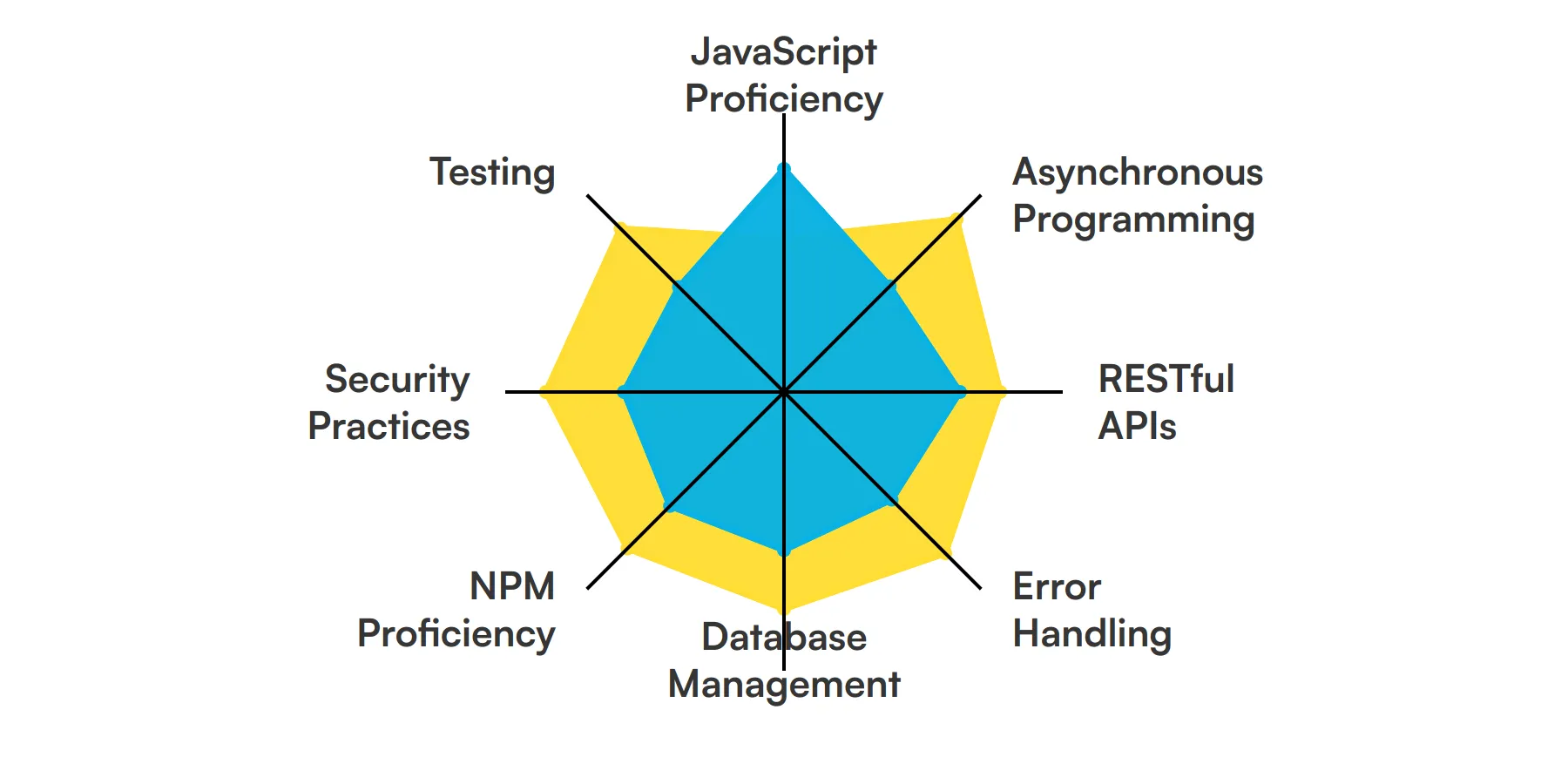
JavaScript Proficiency
A Node.js developer must have a strong grasp of JavaScript, as it's the core language used in Node.js environments. Understanding both basic and advanced JavaScript concepts is necessary to build efficient server-side applications.
For more insights, check out our guide to writing a JavaScript Developer Job Description.
Asynchronous Programming
Node.js operates on non-blocking, event-driven architecture. Mastery in handling asynchronous operations using callbacks, promises, and async/await is crucial for a Node.js developer to manage concurrent processes effectively.
RESTful APIs
Creating and integrating RESTful services is a common task for Node.js developers. They need to be adept at both consuming external APIs and designing their own for diverse front-end consumptions.
Check out our guide for a comprehensive list of interview questions.
Error Handling
Robust error handling strategies are essential for maintaining the reliability of applications. A Node.js developer must be skilled in anticipating, catching, and managing errors gracefully to ensure a smooth user experience.
Database Management
Node.js developers often interact with databases, and must be proficient in database technologies, whether SQL (like PostgreSQL, MySQL) or NoSQL (like MongoDB), to store, query, and manipulate data.
For more insights, check out our guide to writing a Database Administrator (DBA) Job Description.
NPM Proficiency
Understanding the Node Package Manager (NPM) is fundamental for managing third-party packages efficiently. The ability to choose, install, and update packages is key to building functional applications.
Security Practices
Knowledge of security practices is necessary to protect data and defend against threats like SQL injection, XSS, and CSRF. Implementing authentication, authorization, and secure communication is part of the Node.js developer's responsibilities.
Check out our guide for a comprehensive list of interview questions.
Testing
Writing tests using frameworks like Mocha, Jest, or Jasmine is important to ensure the reliability and performance of applications. A Node.js developer uses testing to catch and fix bugs before production.
9 secondary Node JS Developer skills and traits
The best skills for Node JS Developers include Version Control, WebSockets, GraphQL, Continuous Integration, Docker, Cloud Services, Front-end Technologies, Performance Optimization and Microservices Architecture.
Let’s dive into the details by examining the 9 secondary skills of a Node JS Developer.
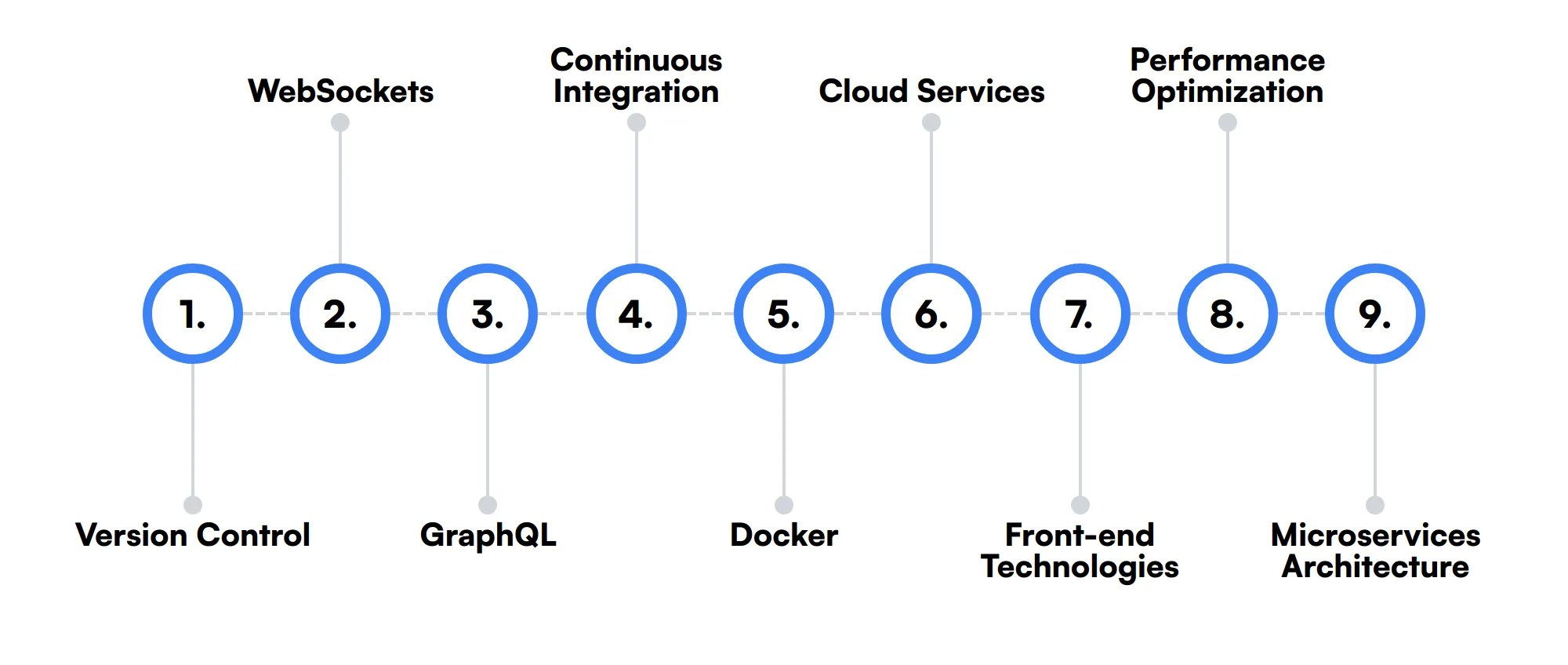
Version Control
Familiarity with version control systems like Git helps Node.js developers manage changes to the project codebase, collaborate with others, and deploy applications efficiently.
WebSockets
Understanding WebSockets enables Node.js developers to implement real-time communication capabilities in applications, essential for features like live chats and interactive games.
GraphQL
Knowledge of GraphQL is a plus for creating flexible and efficient APIs. It allows clients to request exactly the data they need, making it a valuable skill for modern web development.
Continuous Integration
Experience with CI/CD tools like Jenkins or Travis CI helps streamline development and deployment processes, ensuring that new code changes are automatically tested and deployed.
Docker
Proficiency in Docker can be beneficial for creating, deploying, and running applications by using containers, providing consistency across multiple development and release cycles.
Cloud Services
Familiarity with cloud platforms such as AWS, Azure, or Google Cloud Platform enables Node.js developers to deploy scalable and high-availability applications in the cloud.
Front-end Technologies
While primarily server-side, understanding front-end technologies (HTML, CSS, React, Angular) can be advantageous for full-stack development capabilities.
Performance Optimization
Skills in optimizing application performance, such as profiling, load testing, and caching, are valuable to enhance the speed and efficiency of Node.js applications.
Microservices Architecture
Understanding the principles of microservices architecture helps in developing applications that are scalable, maintainable, and loosely coupled.
How to assess Node JS Developer skills and traits
Assessing the skills and traits of a Node.js developer can be a challenging task. While resumes and portfolios provide a snapshot of a candidate's experience, they often fall short in revealing their true proficiency in key areas such as JavaScript, asynchronous programming, and RESTful APIs. To truly understand a candidate's capabilities, a more hands-on approach is necessary.
Skills-based assessments are an effective way to evaluate a Node.js developer's expertise. These assessments can cover a wide range of topics, including error handling, database management, NPM proficiency, security practices, and testing. By focusing on practical tasks and real-world scenarios, you can get a clearer picture of a candidate's strengths and weaknesses.
One way to streamline this process is by using Adaface on-the-job skill tests. These tests can help you achieve a 2x improved quality of hires and an 85% reduction in screening time. With Adaface, you can create customized assessments that align with the specific requirements of your Node.js projects, ensuring you find the right fit for your team.
Let’s look at how to assess Node JS Developer skills with these 6 talent assessments.
JavaScript Online Test
Our JavaScript Online Test gauges a vital front end dev skill. It evaluates candidates on JavaScript fundamentals, ability to manipulate HTML DOM, and asynchronous programming with Ajax, Fetch API, Promises & Async / Await.
The test assesses their understanding of JavaScript basics, structuring and styling HTML DOM, errors and exception handling, working with user data and JSON, and ES6 features. It includes coding questions to evaluate hands-on JavaScript programming skills.
Successful candidates demonstrate proficiency in higher-order functions and closures, OOP concepts, and handling APIs. They also show a strong grasp of asynchronous JavaScript and event loop mechanisms.
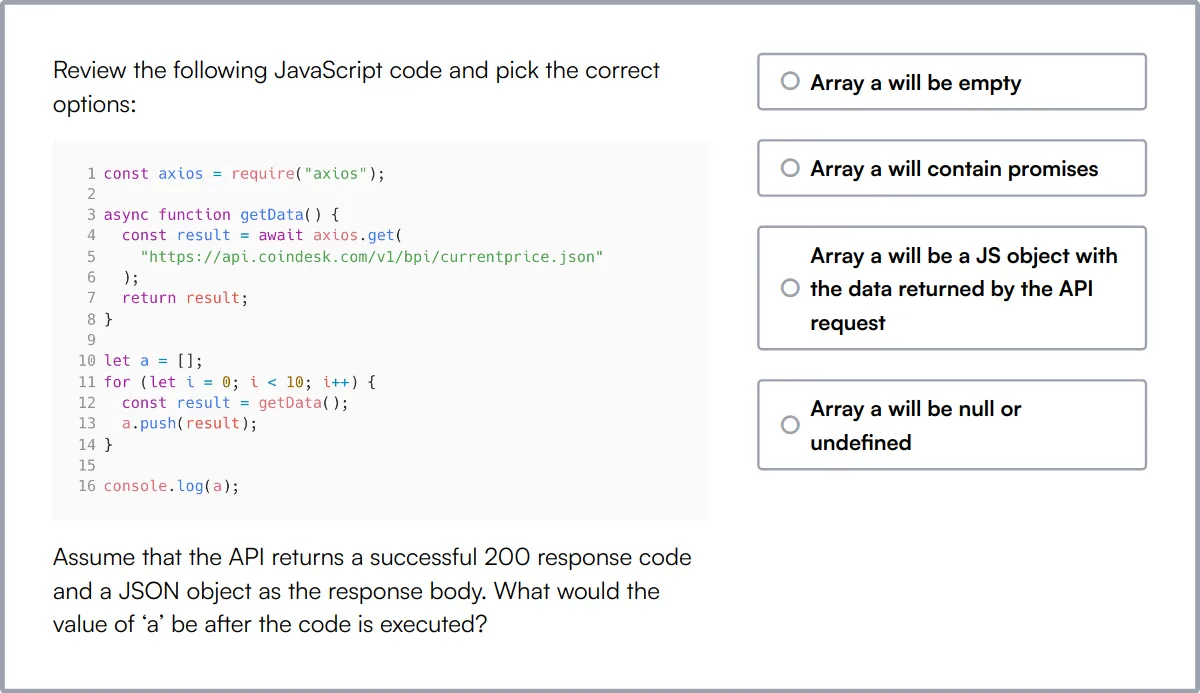
Node.js Online Test
Our Node.js Online Test evaluates a candidate's ability to use Express.js as a web application framework, handle REST APIs, and structure Node applications in modules. It also assesses their skills in using NPM packages and deploying Node apps to production.
The test covers Node.js module system, file system and command line arguments, debugging Node.js, asynchronous Node.js and promises, and REST APIs and web servers. It includes code-tracing MCQ questions and coding questions to evaluate hands-on JavaScript programming skills.
High-scoring candidates show proficiency in API authentication and security, testing and releasing Node.js applications, and in-depth knowledge of the Express.js framework. They also demonstrate a solid understanding of the event loop and timers.
REST API Test
Our REST API Test evaluates a candidate's understanding of RESTful APIs and their ability to create, interact, and test them. It includes multiple-choice questions to assess knowledge of REST principles, HTTP methods, and best practices.
The test covers API integrations, REST API basics, API design, best practices, and designing backend services. It includes coding questions to evaluate hands-on skills in creating and interacting with RESTful APIs.
Successful candidates demonstrate a strong grasp of HTTP status codes, authentication methods, and serialization formats. They also show proficiency in coding and designing efficient backend services.
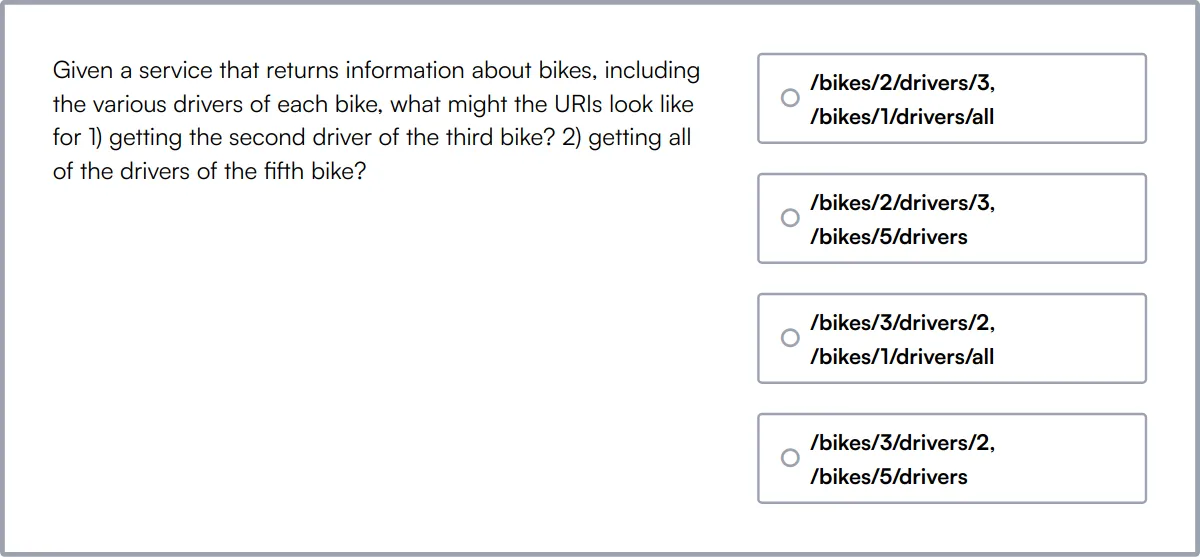
SQL Online Test
Our SQL Online Test evaluates a candidate's ability to design and build relational databases and tables from scratch. It assesses their skills in applying CRUD operations, writing efficient queries, and creating indexes for faster SQL queries.
The test covers creating databases, creating and deleting tables, CRUD operations on tables, joins and subqueries, and conditional expressions and procedures. It includes multiple-choice questions to evaluate knowledge of SQL fundamentals.
High-scoring candidates demonstrate proficiency in views, indexes, string functions, mathematical functions, and timestamps. They also show a solid understanding of locks and transactions, scaling, and security.

Penetration Testing Test
Our Penetration Testing Test evaluates a candidate's knowledge and skills in penetration testing, network security, vulnerability assessment, and web application security. It assesses their ability to identify vulnerabilities and provide recommendations for improving security.
The test covers penetration testing, network security, vulnerability assessment, and web application security. It includes multiple-choice questions to evaluate knowledge of ethical hacking and security best practices.
Successful candidates demonstrate proficiency in identifying and exploiting vulnerabilities and providing security recommendations. They also show a strong understanding of network security principles and web application security measures.
Jest Test
Our Jest Test evaluates candidates on their knowledge of Jest, a popular JavaScript testing framework used for testing React and Node.js applications. It covers topics such as testing fundamentals, test-driven development, and Jest configuration.
The test assesses their understanding of data layers, statistical layers, initializers, test execution, and Mocha backends. It includes multiple-choice questions to evaluate knowledge of Jest and its integration with other tools and frameworks.
High-scoring candidates demonstrate proficiency in writing effective and maintainable test cases, debugging and troubleshooting testing issues, and integrating Jest with other tools and frameworks. They also show a solid understanding of async testing and snapshot testing.
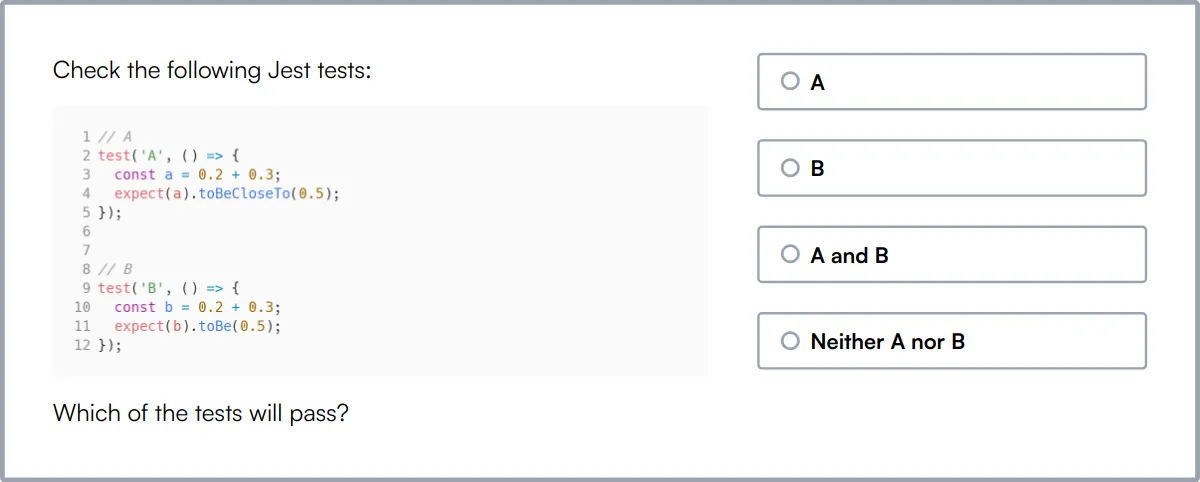
Summary: The 8 key Node JS Developer skills and how to test for them
| Node JS Developer skill | How to assess them |
|---|---|
| 1. JavaScript Proficiency | Evaluate the ability to write clean, functional JavaScript code. |
| 2. Asynchronous Programming | Assess understanding of promises, async/await, and event loops. |
| 3. RESTful APIs | Check skills in designing and consuming RESTful services. |
| 4. Error Handling | Determine how well errors are managed and debugged. |
| 5. Database Management | Gauge proficiency in interacting with SQL and NoSQL databases. |
| 6. NPM Proficiency | Evaluate the ability to manage project dependencies using NPM. |
| 7. Security Practices | Assess knowledge of securing Node.js applications. |
| 8. Testing | Check skills in writing and running unit and integration tests. |
Node.js Online Test
Node JS Developer skills FAQs
What is the importance of JavaScript proficiency for a Node.js developer?
JavaScript is the core language for Node.js. Proficiency in JavaScript ensures that developers can write clean, efficient, and maintainable code.
How can you assess a candidate's understanding of asynchronous programming?
Ask candidates to explain concepts like callbacks, promises, and async/await. You can also give them coding tasks that involve handling asynchronous operations.
Why is experience with RESTful APIs important for Node.js developers?
RESTful APIs are commonly used for communication between servers and clients. Experience with them ensures that developers can build scalable and maintainable APIs.
What are some key aspects of error handling in Node.js?
Key aspects include using try-catch blocks, handling promise rejections, and implementing global error handlers to ensure application stability.
How do you evaluate a candidate's database management skills?
Check their experience with databases like MongoDB, MySQL, or PostgreSQL. Ask them to design a simple database schema or write queries.
What is the role of NPM in Node.js development?
NPM is the package manager for Node.js. It allows developers to manage project dependencies and share reusable code modules.
How can you test a candidate's knowledge of security practices in Node.js?
Ask about common security vulnerabilities like SQL injection, XSS, and CSRF. Check if they know how to use tools like Helmet and express-rate-limit.
Why is version control important for Node.js developers?
Version control systems like Git help manage code changes, collaborate with team members, and maintain a history of project development.

40 min skill tests.
No trick questions.
Accurate shortlisting.
We make it easy for you to find the best candidates in your pipeline with a 40 min skills test.
Try for freeRelated posts
Free resources



